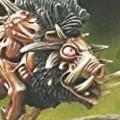| Author |
Message |
 |
|
|
 |
|
Advert
|
Forum adverts like this one are shown to any user who is not logged in. Join us by filling out a tiny 3 field form and you will get your own, free, dakka user account which gives a good range of benefits to you:
- No adverts like this in the forums anymore.
- Times and dates in your local timezone.
- Full tracking of what you have read so you can skip to your first unread post, easily see what has changed since you last logged in, and easily see what is new at a glance.
- Email notifications for threads you want to watch closely.
- Being a part of the oldest wargaming community on the net.
If you are already a member then feel free to login now. |
|
 |
![[Post New]](/s/i/i.gif) 2022/12/05 22:50:15
Subject: Warhammer The Old World
|
 |

Secret Force Behind the Rise of the Tau
USA
|
 kodos wrote: kodos wrote:Fantasy as a Genre is usually good at time scale and some are very good
the problem with Warhammer is that the nations are real live copies frozen in time
The second line defines basically all fantasy as a genre. Little of it has a real sense of meaningful progression, let alone one that follows anything realistic in terms of scale. Take a look at AsoiF sometime. Anything before the Dragons show up is a completely wackadoo sense of time passing and how long things last. Fantasy throws around 'thousands of years' like its candy and human civilization on Earth has basically gone from bronze to digital in 3500 years. Most fantasy timelines are replete with what we could criticize Warhammer of. It's not unique to this setting.
Honestly if anything I'd say Warhammer fantasy is better than most since it actually bothers to try and provide a complex chain of history. Most fantasy doesn't.
|
|
This message was edited 3 times. Last update was at 2022/12/05 22:56:01
|
|
|
 |
 |
![[Post New]](/s/i/i.gif) 2022/12/05 22:55:37
Subject: Warhammer The Old World
|
 |

Decrepit Dakkanaut
UK
|
If anything I think the only major fantasy series that actually shows a real world style advance is Discworld!
|
|
|
|
 |
 |
![[Post New]](/s/i/i.gif) 2022/12/05 22:58:34
Subject: Warhammer The Old World
|
 |

Secret Force Behind the Rise of the Tau
USA
|
 Overread wrote: Overread wrote:If anything I think the only major fantasy series that actually shows a real world style advance is Discworld!
Malazan is pretty applauded for making use of the author's anthropological knowledge. The setting has a pretty fantastic sense of how cultures evolve, grow, rise, fall, and transform.
Honestly fantasy has gotten better at this as time has gone on, but it's still common for the phrase 'stood for thousands of years' to get thrown around. And fantasy loves the trope of older Romanesque civilizations being more advanced than the ones that follow.
In all of human history, almost nothing has lived a thousand years. It's damned impressive when anything lasts more than 2-300 years up until the early modern age and advances in communication made it easier to maintain centralized states without having to make dangerous power compromises with regional rulers.
|
|
This message was edited 3 times. Last update was at 2022/12/05 23:00:36
|
|
|
 |
 |
![[Post New]](/s/i/i.gif) 2022/12/06 00:23:58
Subject: Warhammer The Old World
|
 |

Regular Dakkanaut
|
 LordofHats wrote: LordofHats wrote: kodos wrote: kodos wrote:Fantasy as a Genre is usually good at time scale and some are very good
the problem with Warhammer is that the nations are real live copies frozen in time
The second line defines basically all fantasy as a genre. Little of it has a real sense of meaningful progression, let alone one that follows anything realistic in terms of scale. Take a look at AsoiF sometime. Anything before the Dragons show up is a completely wackadoo sense of time passing and how long things last. Fantasy throws around 'thousands of years' like its candy and human civilization on Earth has basically gone from bronze to digital in 3500 years. Most fantasy timelines are replete with what we could criticize Warhammer of. It's not unique to this setting.
Honestly if anything I'd say Warhammer fantasy is better than most since it actually bothers to try and provide a complex chain of history. Most fantasy doesn't.
I wouldn't use real world history as an example of how society is bound to progress, from around ~500AD to ~1200AD, Europe largely stagnated on a macro level. In Britannia over about 50-75 years, people devolved from an urban prosperous society to living in wooden houses and thinking giants built the crumbling ruins they lived amongst. The Bronze Age collapse occurred. A few new pathogens destroyed American societies and one particularly virulent one nearly destroyed Medieval Europe, just when it was regaining some level of economic prosperity after the collapse of Rome nearly a thousand years previously (technologically it was still a mixed bag). China largely stagnated on a technological basis for centuries under the Qing.
Yes ASOIAF is a bit whackadoo in it's numbers, it's also poor in terms of it's military numbers as well. However the idea that society is progressing on one uniform always progressing path is far from true, even in our world, let alone one with magic and other species that can compete with humans.
|
|
|
 |
 |
![[Post New]](/s/i/i.gif) 2022/12/06 01:05:24
Subject: Warhammer The Old World
|
 |

Secret Force Behind the Rise of the Tau
USA
|
Not really. The 'Dark Ages' is something historians of the Middle Ages have been trying to get rid of for ages. Technology and society never stagnated. People living in the Renaissance simply liked to portray themselves as reclaiming a golden age spirit lost to time.
And beyond that, the Bronze Age is not a purely European phenomena. It applied to Asia and Africa as well, and really until the early modern period none of these regions were of significantly greater sophistication than the others. The Americas were behind, but the earliest complex civilizations in the Americans begin appearing around the same time the Bronze Age was ending.
I'm not making an argument that progress is inevitable.
Change is, and things tend to change a lot in 100 years, let alone 200 or 300. Globally speaking, anything lasting more than a few centuries is impressive. Things change rapidly in real human terms. It's fantasy of course and its scale and grandeur is part of the appeal. I'm only saying obsessing over how the Empire didn't follow a rapid progression is kind of calling the black kettle a black kettle. That's what a black kettle is.
|
|
|
|
 |
 |
![[Post New]](/s/i/i.gif) 2022/12/06 07:20:38
Subject: Warhammer The Old World
|
 |

Not as Good as a Minion
|
Dark Age and Renaissance are very local development which affected other regions but were used as focus point
as yes, Britain went thru a Dark Age with the Romano-Britons leaving and the Saxons taking over, but not all of Europe for several hundred years
the Renaissance came up because the Southern Europeans discovered that the ancient writings still exist in the north where important information was written in parchment which lasts centuries were in the south papyrus was still in use and therefore written information from previous times only available as fragments if someone took care and copied it on a regular basis over centuries
Progress and Growth are not necessarily combined, for a technology to succeed it must be the right time with the right needs and the right materials must be available
as I wrote Rifles existed for centuries, but higher rate of fire was more important than accuracy of a single shot, hence it was not used in masses until there was the possibility to increase the rate of fire
same for breach loading weapons, it was the combination of the brass cartridge and the percussion cap that made it possible to use in masses (breach loading rifled musket with wheellock and steel cartridge existed as a hunting gun ~1650, but it took 250 years until the concept became a military standard)
For Fantasy Settings in general, well Lord of the Rings does a very good progression of time and development (from magic being strong and an everyday thing to something exotic while technology based on or mixed with magic is lost and new things developing)
A Song of Ice and Fire might be different but in general it is inspired by the Wars of the Roses, and the setting is late Medieval England with Dragons so while time scale and pacing is off for a better story, it was never meant to be a progressive time scale a wider historic scale (it is more like how people think the Dark Age in England was and that it turned straight into the late medieval period, missing that there are a 1000 years of events in between)
 LordofHats wrote: LordofHats wrote:Honestly if anything I'd say Warhammer fantasy is better than most since it actually bothers to try and provide a complex chain of history. Most fantasy doesn't.
a Calander with events is not unique to Warhammer and the developments are not really there at all, it just stretches 500 years of history over 2500 years fills in the gabs (which is very well done), hence the technological advance is stretched as well without much thinking about if this makes any sense or not
 Overread wrote: Overread wrote:Dwarves are hyper protective over their technology. There is every chance that if you were found to be trading advanced weapons to another race you'd likely be imprisoned in some dwarfish fashion.
They would then set too in tracking down and recovering any of the sold items and ensuring others didn't recreate it.
Which is another aspect to consider, its one thing to buy and use a weapon but its another to make them. Native Americans, from my limited understanding, would trade for guns, but lacked the proper infrastructure and in-community knowledge to replicate the technology. Plus it was likely easier to just trade for more.
Heck consider how many things in your very house you use every single day but you could never re-create them. You might understand the theory of how they work and even are made ,but actually making them is vastly different.
well, there is a difference if you say Russia cannot build an M1 Abrahams, or Russia cannot build tracked vehicles and use HEAT shells because the M1 is a highly protected technology
and for a country that has the industrial base and even produces weapons similar advanced but different (Volley Fire Gun) with some foreign engineers working there (aka Imperial Dwarfs are a thing) reverse engineering is not only possible but very likely, especially for something that increases safety and reliability while being as simple to produce
the Empire models just did not use something else because they are modelled after the historical counterpart, who used certain weapons and adjusting them for in-game technological level was not seen as necessary (or they never thought of it at all because the Empire State Troops is the army of the HRE in 1450 and therefore must look exactly like those)
|
|
This message was edited 1 time. Last update was at 2022/12/06 07:27:34
Harry, bring this ring to Narnia or the Sith will take the Enterprise |
|
|
 |
 |
![[Post New]](/s/i/i.gif) 2022/12/06 14:44:57
Subject: Warhammer The Old World
|
 |

Grim Dark Angels Interrogator-Chaplain
Vigo. Spain.
|
The reason why most fantasy settings have thousands of years without cultural or technological changes with the exception of the used trope of "Technologically advanced proto-empire converts into pseudo medieval kingdoms" is because making a fantasy world is hard enough. Making a fantasy world for each 200 year period , to reflect cultural and historical evolution is even harder. Even Sci-fi settings suffer this. Look at Star Wars, old republic vs new republic, theres "advancements" but more similar to Iphone 8 to Iphone 10 than what 10.000 years should have accomplished.
|
|
This message was edited 1 time. Last update was at 2022/12/06 14:45:47
 Crimson Devil wrote: Crimson Devil wrote:
Dakka does have White Knights and is also rather infamous for it's Black Knights. A new edition brings out the passionate and not all of them are good at expressing themselves in written form. There have been plenty of hysterical responses from both sides so far. So we descend into pointless bickering with neither side listening to each other. So posting here becomes more masturbation than conversation.
ERJAK wrote:Forcing a 40k player to keep playing 7th is basically a hate crime.
|
|
|
 |
 |
![[Post New]](/s/i/i.gif) 2022/12/06 14:47:36
Subject: Warhammer The Old World
|
 |

Trazyn's Museum Curator
|
 LordofHats wrote: LordofHats wrote: kodos wrote: kodos wrote:Danny76 wrote:Guns predated the steam tank right? And wasn’t the inventor of that around 2000. So I guess they’d had at least 500 years of time up to End Times/original setting.
yeah, Steam Tank was around the 2000, yet we still have matchlock as standard state troop weapon in 2500, with wheelock for elites/heroes and dwarfs use flintlock there did not happen a lot regarding weapon development in 500 years where in real live it took ~150 years from the matchlock to the flintlock,
Fantasy in general, as a genre, has a piss poor conception of timescales. Of course, one could also say that just because a technology can advance doesn't mean it will. The Chinese discovered gunpowder in the 9th or 10th century, but they were never as fast to develop it as the Europeans and Muslims who acquired it a few hundred years later. Outside of artillery and rocketry, Chinese firearms developed into rudimentary hand cannons and then didn't change much for 500 years. The Europeans and Ottomans meanwhile took the weapons and went hogwild developing them.
The Japanese too, at least until the Sengoku Jidai ended and Tokugawa put a ban on everything European. But yeah, technological advancement isn't exactly linear. It's not like a strategy game where you have a tech tree and a step by step progression. There's a lot of different factors at play, such as geography, local resources and politics. Of course, making a complex geo-political landscape in a setting from scratch (complete with a viable economic system of course) is really, really hard, so much writers just cheat and throw in what they want.
|
|
This message was edited 6 times. Last update was at 2022/12/06 15:01:28
What I have
 ~4100 ~4100
 ~1660 ~1660
Westwood lives in death!
Peace through power!
A longbeard when it comes to Necrons and WHFB. Grumble Grumble
|
|
|
 |
 |
![[Post New]](/s/i/i.gif) 2022/12/06 15:45:17
Subject: Warhammer The Old World
|
 |

Rookie Pilot
|
I think it's a good omen that this thread remains one of Dakkas most active dispite there being no news for months at a time.
Let's hope the entusiasm remains high after release!
|
|
|
 |
 |
![[Post New]](/s/i/i.gif) 2022/12/06 16:32:55
Subject: Warhammer The Old World
|
 |

Decrepit Dakkanaut
UK
|
 Galas wrote: Galas wrote:The reason why most fantasy settings have thousands of years without cultural or technological changes with the exception of the used trope of "Technologically advanced proto-empire converts into pseudo medieval kingdoms" is because making a fantasy world is hard enough. Making a fantasy world for each 200 year period , to reflect cultural and historical evolution is even harder. Even Sci-fi settings suffer this. Look at Star Wars, old republic vs new republic, theres "advancements" but more similar to Iphone 8 to Iphone 10 than what 10.000 years should have accomplished.
Actually it might be easier for the writer, its harder for the reader.
Consider how most people consider historical periods as a single concept in their minds eye. Say Romans and people think of hundreds of years and thousands of miles as basically some abomination amalgamation of it all squished together into one time period. Same for the Medieval age or many others. Unless you actually study it, our concept of the past is very vague and generalist.
And this mostly works because unless we are studying or doing something in-depth related to an historical period and region; we don't need that level of fine understanding to chat about it casually.
Furthermore in a book you can only cover so much information to the reader before they get overwhelmed and lost. The story gets lost in the woods of detail and history and such. So having fairly static elements lasting for a long time and such works well to convey things to the reader without going into so much detail that the start of the book his the Silmarillion history lesson for the setting. Even Lord of the Rings doesn't need you to read all the background information to enjoy Lord of the Rings. If you do then you can enjoy some elements deeper; you get what a Balrog is the moment its mentioned; you understand the threat of the Dark Lord and the like. You can appreciate it on a deeper level, but you don't have to to enjoy the story itself.
|
|
|
|
 |
 |
![[Post New]](/s/i/i.gif) 2022/12/06 16:45:37
Subject: Warhammer The Old World
|
 |

Longtime Dakkanaut
|
 Ohman wrote: Ohman wrote:I think it's a good omen that this thread remains one of Dakkas most active dispite there being no news for months at a time.
Let's hope the entusiasm remains high after release!
Enthusiasm?! I am waiting patiently for GW´s next train wreck while happily staying with 9th Age. You told me to leave and I won´t be coming back, Gee-Dubs. 
|
|
|
 |
 |
![[Post New]](/s/i/i.gif) 2022/12/06 16:53:26
Subject: Warhammer The Old World
|
 |

Regular Dakkanaut
|
 LordofHats wrote: LordofHats wrote:Not really. The 'Dark Ages' is something historians of the Middle Ages have been trying to get rid of for ages. Technology and society never stagnated. People living in the Renaissance simply liked to portray themselves as reclaiming a golden age spirit lost to time.
And beyond that, the Bronze Age is not a purely European phenomena. It applied to Asia and Africa as well, and really until the early modern period none of these regions were of significantly greater sophistication than the others. The Americas were behind, but the earliest complex civilizations in the Americans begin appearing around the same time the Bronze Age was ending.
I'm not making an argument that progress is inevitable.
Change is, and things tend to change a lot in 100 years, let alone 200 or 300. Globally speaking, anything lasting more than a few centuries is impressive. Things change rapidly in real human terms. It's fantasy of course and its scale and grandeur is part of the appeal. I'm only saying obsessing over how the Empire didn't follow a rapid progression is kind of calling the black kettle a black kettle. That's what a black kettle is.
The 'Dark Ages' is indeed an outdated and too generalist term, outside of Britain at least which genuinely did experience something like that, thus why I avoided the term. It doesn't change the fact that Europe was technologically, infrastructurally and economically inferior to Rome until it started to match and surpass it some time around 1000-1200 (even as late as the 1700s/1800s for some engineering/infrastructure aspects), depending on what specific areas you wanted to look at. Leaving that aside, an individual free human's experience wasn't vastly different from 0AD to about 1800AD, that's a prolonged period when for the average people the core experience of humanity didn't change.
That's not to say GRRM's daft stuff like the Starks ruling for 1,000s of years makes any sense but you can easily argue for societies to remain relatively stagnant economically/militarily for centuries. Culture tends to be more subject to flux.
|
|
|
 |
 |
![[Post New]](/s/i/i.gif) 2022/12/06 17:29:37
Subject: Warhammer The Old World
|
 |

Grim Dark Angels Interrogator-Chaplain
Vigo. Spain.
|
Yeah. I know things changed and advanced but people overvalues how the living experience of your average peasant farmer changed from 500 BC to 1500 AC or even latter.
My great grandparents were living in shacks and small houses, sleeping with cows and donkeys, and living of the land with hand tools and no electricity or running water (No tractors or whatsoever) circa 1900 , because they were from a small village in Galicia, Spain.
|
 Crimson Devil wrote: Crimson Devil wrote:
Dakka does have White Knights and is also rather infamous for it's Black Knights. A new edition brings out the passionate and not all of them are good at expressing themselves in written form. There have been plenty of hysterical responses from both sides so far. So we descend into pointless bickering with neither side listening to each other. So posting here becomes more masturbation than conversation.
ERJAK wrote:Forcing a 40k player to keep playing 7th is basically a hate crime.
|
|
|
 |
 |
![[Post New]](/s/i/i.gif) 2022/12/06 19:01:41
Subject: Re:Warhammer The Old World
|
 |

Executing Exarch
|
Mechanically, early guns shouldn't be that difficult to copy with the Empire's technology. The quality might not be quite the same as what the dwarves are making. But the basic mechanisms are easy to replicate if there's one available to study for even a short bit of time. These aren't steam tanks or flying machines that we're talking about. Issues would likely be focused on gunpowder quality, and building enough of them before the modern assembly line. Based on my admittedly limited understanding of firearms development, I think you could reach firearms technology of the early nineteenth century and still have that apply. It's not until the middle of that century (the Gatling gun -introduced in 1862 - is a decent though not absolute marker, imo) that you start to require a level of precision work unavailable in the Empire.
|
|
|
 |
 |
![[Post New]](/s/i/i.gif) 2022/12/06 19:02:17
Subject: Warhammer The Old World
|
 |

Humming Great Unclean One of Nurgle
|
 Overread wrote: Overread wrote: Galas wrote: Galas wrote:The reason why most fantasy settings have thousands of years without cultural or technological changes with the exception of the used trope of "Technologically advanced proto-empire converts into pseudo medieval kingdoms" is because making a fantasy world is hard enough. Making a fantasy world for each 200 year period , to reflect cultural and historical evolution is even harder. Even Sci-fi settings suffer this. Look at Star Wars, old republic vs new republic, theres "advancements" but more similar to Iphone 8 to Iphone 10 than what 10.000 years should have accomplished.
Actually it might be easier for the writer, its harder for the reader.
Consider how most people consider historical periods as a single concept in their minds eye. Say Romans and people think of hundreds of years and thousands of miles as basically some abomination amalgamation of it all squished together into one time period. Same for the Medieval age or many others. Unless you actually study it, our concept of the past is very vague and generalist.
And this mostly works because unless we are studying or doing something in-depth related to an historical period and region; we don't need that level of fine understanding to chat about it casually.
Furthermore in a book you can only cover so much information to the reader before they get overwhelmed and lost. The story gets lost in the woods of detail and history and such. So having fairly static elements lasting for a long time and such works well to convey things to the reader without going into so much detail that the start of the book his the Silmarillion history lesson for the setting. Even Lord of the Rings doesn't need you to read all the background information to enjoy Lord of the Rings. If you do then you can enjoy some elements deeper; you get what a Balrog is the moment its mentioned; you understand the threat of the Dark Lord and the like. You can appreciate it on a deeper level, but you don't have to to enjoy the story itself.
Yup. I have learned that when writing settings I need to go back at the end and write an abridged de-detailed version that people can keep track of on the fly. Tropes are really helpful for that; I can say 'like Vikings' and deliver an immense amount of cultural and historical depth about a fictional faction with two words. Automatically Appended Next Post: Eumerin wrote:Mechanically, early guns shouldn't be that difficult to copy with the Empire's technology. The quality might not be quite the same as what the dwarves are making. But the basic mechanisms are easy to replicate if there's one available to study for even a short bit of time. These aren't steam tanks or flying machines that we're talking about. Issues would likely be focused on gunpowder quality, and building enough of them before the modern assembly line. Based on my admittedly limited understanding of firearms development, I think you could reach firearms technology of the early nineteenth century and still have that apply. It's not until the middle of that century (the Gatling gun -introduced in 1862 - is a decent though not absolute marker, imo) that you start to require a level of precision work unavailable in the Empire.
At the same time something like rifling or the functionality of a bullet shape would be incredibly easy to miss and have humans shrug, going 'well it's not Dwarfen, makes sense it doesn't work as well'.
|
|
This message was edited 1 time. Last update was at 2022/12/06 19:04:31
Road to Renown! It's like classic Path to Glory, but repaired, remastered, expanded! https://www.dakkadakka.com/dakkaforum/posts/list/778170.page
I chose an avatar I feel best represents the quality of my post history.
I try to view Warhammer as more of a toolbox with examples than fully complete games. |
|
|
 |
 |
![[Post New]](/s/i/i.gif) 2022/12/06 19:24:41
Subject: Warhammer The Old World
|
 |

Servoarm Flailing Magos
|
 Galas wrote: Galas wrote:Yeah. I know things changed and advanced but people overvalues how the living experience of your average peasant farmer changed from 500 BC to 1500 AC or even latter.
My great grandparents were living in shacks and small houses, sleeping with cows and donkeys, and living of the land with hand tools and no electricity or running water (No tractors or whatsoever) circa 1900 , because they were from a small village in Galicia, Spain.
A lot, and i mean a lot, of people still functionally live like that today - it may even be that in absolute, though not relative, numbers more people live like that today than did around 1900, considering that the world population back then was a fifth of the population today.
|
|
|
 |
 |
![[Post New]](/s/i/i.gif) 2022/12/06 19:29:13
Subject: Warhammer The Old World
|
 |

Not as Good as a Minion
|
and a very big difference, that makes this actual possible are modern fertilizers as living from the land you own was more difficult 100/150 years ago and "the land" not able to feed that many people
 NinthMusketeer wrote: NinthMusketeer wrote:At the same time something like rifling or the functionality of a bullet shape would be incredibly easy to miss and have humans shrug, going 'well it's not Dwarfen, makes sense it doesn't work as well'.
which was also the main change in gun development in modern times, the shape and design of the bullet, which was a round ball for a very long time for several different reasons
while rifling was adopted very early, the first guns came up ~1350 the first rifling ~1450, but it took until ~1850 for modern bullets
one reason for this was that the principle of a rotation stabilised ammunition for better accuracy and range was already used for arrows, and that part is a little harder to miss as humans in the Empire would see that the arrows fired at them by elves look a little different to their own and if they used those to shoot back they would also fly better than their own (unlike a deformed bullet)
|
|
This message was edited 1 time. Last update was at 2022/12/06 19:31:51
Harry, bring this ring to Narnia or the Sith will take the Enterprise |
|
|
 |
 |
![[Post New]](/s/i/i.gif) 2022/12/06 20:02:18
Subject: Warhammer The Old World
|
 |

[MOD]
Otiose in a Niche
|
There's also the example of Mesoamerica.
No metallurgy (other than gold jewelry), no wheels (other than toys) and yet build monumental stone structures and mega cities.
Technology can skip steps, you'll suffer from it, but it can.
|
|
|
|
 |
 |
![[Post New]](/s/i/i.gif) 2022/12/06 20:24:51
Subject: Warhammer The Old World
|
 |

Scarred Ultramarine Tyrannic War Veteran
Maple Valley, Washington, Holy Terra
|
It's another interesting example of how worldbuilding for games is influenced by the game design and production constraints of those games. In this case, the constraint of "we want these models to be usable in a variety of settings and time periods" engendered a period of stagnation in technology and fashion in the Empire.
|
"Calgar hates Tyranids."
 Your #1 Fan Your #1 Fan  |
|
|
 |
 |
![[Post New]](/s/i/i.gif) 2022/12/06 20:28:12
Subject: Warhammer The Old World
|
 |

Servoarm Flailing Magos
|
 Kid_Kyoto wrote: Kid_Kyoto wrote:There's also the example of Mesoamerica.
No metallurgy (other than gold jewelry), no wheels (other than toys) and yet build monumental stone structures and mega cities.
Technology can skip steps, you'll suffer from it, but it can.
It can also be repeatedly lost and rediscovered, like the link between vitamin C, citrus fruit and the prevention of scurvy, or stagnate because all the pieces are there, but nobody takes the steps to link them up to something greater. The greeks for example had iron railed cartways that they used to transport goods over moderate distances, they had all sorts of sophisticated machinery with gears and levers, and they had simple steam engines they used for entertainment purposes, but they never came up with the idea to make a practical steam engine, or they came up with it and failed to make it work well enough to be worth the effort.
|
|
|
 |
 |
![[Post New]](/s/i/i.gif) 2022/12/06 21:06:53
Subject: Warhammer The Old World
|
 |

[MOD]
Otiose in a Niche
|
Things like metallurgy and material science matter too.
IIRC it's not that China didn't fight wars, didn't weaponize gun powder and didn't need weapons to survive. But the quality of their metals and the fact they had not developed screws to seal the back of a cannon made their weapons impractical.
It was only when European metal and engineering met Chinese gunpowder that guns became practical.
So I know about the Greek and their proto steam engines but I'm not sure they could have made that leap with the other limitations on their technology.
|
|
This message was edited 1 time. Last update was at 2022/12/06 22:39:11
|
|
|
 |
 |
![[Post New]](/s/i/i.gif) 2022/12/06 21:42:33
Subject: Warhammer The Old World
|
 |

Secret Force Behind the Rise of the Tau
USA
|
 Galas wrote: Galas wrote:Yeah. I know things changed and advanced but people overvalues how the living experience of your average peasant farmer changed from 500 BC to 1500 AC or even latter.
To be fair, the average living experience of 99% of humanity did not significantly change much at all between 5000 BC and 16-1700 AD. Farmers, laborers, and craftsmen generally lived more or less the same basic life across that entire period. It's really only in the early modern period when literacy started rising and economics began advancing a middle class that daily life and living really started to transform for the typical person.
|
|
|
|
 |
 |
![[Post New]](/s/i/i.gif) 2022/12/06 21:47:43
Subject: Warhammer The Old World
|
 |

Decrepit Dakkanaut
|
 Kid_Kyoto wrote: Kid_Kyoto wrote:Things like metallurgy and material science matter too.
IIRC it's not that China didn't fight wars, didn't weaponize gun powder and didn't need weapons to survive. But the quality of their metals and the fact they had not developed screws to seal the back of a cannon made their weapons impractical.
It was only when European metal and engineering met Chinese gunpowder that guns became practical.
So I know about the Greek and their proto steam engines but I'm not sure they could have made that leap with the other limitations on their technology.
They also show that you can get too good at one technology too fast (pottery and porcelain) and that means you just never develop the alternative that is useful in many other ways (glass working)
|
|
This message was edited 1 time. Last update was at 2022/12/06 22:39:35
|
|
|
 |
 |
![[Post New]](/s/i/i.gif) 2022/12/06 21:55:45
Subject: Warhammer The Old World
|
 |

Mighty Vampire Count
|
 kodos wrote: kodos wrote:and a very big difference, that makes this actual possible are modern fertilizers as living from the land you own was more difficult 100/150 years ago and "the land" not able to feed that many people
 NinthMusketeer wrote: NinthMusketeer wrote:At the same time something like rifling or the functionality of a bullet shape would be incredibly easy to miss and have humans shrug, going 'well it's not Dwarfen, makes sense it doesn't work as well'.
which was also the main change in gun development in modern times, the shape and design of the bullet, which was a round ball for a very long time for several different reasons
while rifling was adopted very early, the first guns came up ~1350 the first rifling ~1450, but it took until ~1850 for modern bullets
one reason for this was that the principle of a rotation stabilised ammunition for better accuracy and range was already used for arrows, and that part is a little harder to miss as humans in the Empire would see that the arrows fired at them by elves look a little different to their own and if they used those to shoot back they would also fly better than their own (unlike a deformed bullet)
Also being able to build guns with interchangable parts on an industrial scale was not possible until the later 19th century IIRC?
Society plays a part - the Romans did not advance much because they did not need or want to and partly due to slavery - they were great at polishing known tech but pretty poor at new tech - also as they Empire was made interdependant that caused huge problems when it began to fall apart.
Population does seem to have declined in the "Dark Ages"?
|
I AM A MARINE PLAYER
"Unimaginably ancient xenos artefact somewhere on the planet, hive fleet poised above our heads, hidden 'stealer broods making an early start....and now a bloody Chaos cult crawling out of the woodwork just in case we were bored. Welcome to my world, Ciaphas."
Inquisitor Amberley Vail, Ordo Xenos 
"I will admit that some Primachs like Russ or Horus could have a chance against an unarmed 12 year old novice but, a full Battle Sister??!! One to one? In close combat? Perhaps three Primarchs fighting together... but just one Primarch?" da001
www.dakkadakka.com/dakkaforum/posts/list/528517.page
A Bloody Road - my Warhammer Fantasy Fiction |
|
|
 |
 |
![[Post New]](/s/i/i.gif) 2022/12/06 22:15:12
Subject: Warhammer The Old World
|
 |

Secret Force Behind the Rise of the Tau
USA
|
Regional rises and falls in population are common in history. Singling out the decline in population following the fall of the Western Empire as 'unique' is fallacious. Anytime there is a serious disruption in trade, food, and state structure, population drops.
On top of that, it's not even thought that the population really fell appreciably anymore. The Age of Migrations has encompassed a larger and large timescale as scholarship has advanced. It's pretty common now for it to include the entire period of the late empire up through the Early Middle Ages and the Viking Age as the tail end of this period (archeologists and anthropologists have been leading on this rather than historians). It's very difficult to actually track regional populations and the dynamics of the period skews data because so many populations were moving en mass throughout this period. Part of this is a direct result of Roman success with infrastructure plus social and political changes on the Eurasian Steppe and Northern Europe. Roman roads and internal policies made it very easy for large population groups to move through Europe faster than they could leave appreciable bodies of evidence for us to track.
Maybe the population fell, but we're not so sure anymore. Tracking population data lacking any sort of census has always been a crap shoot. There's a lot of strong arguments being made that it probably didn't. We just lost a reliable way to actually the gauge the populations we're dealing with because they started moving around so much.
It was called the Dark Ages for a time because the number of books produced in the period did drop, but that too is probably a questionable thing to single out since this period still saw a general rise in literacy. It's generally rare to see the term Dark Ages used outside of British scholarship, and on that I'd argue that British Scholars are just being stubborn. Most historians want to kill the phrase because they think it has too much baggage that runs counter to newer developments and discoveries.
|
|
This message was edited 6 times. Last update was at 2022/12/06 22:18:44
|
|
|
 |
 |
![[Post New]](/s/i/i.gif) 2022/12/06 22:29:28
Subject: Warhammer The Old World
|
 |

Longtime Dakkanaut
|
As mentioned earlier.
Magic. Plays a huge role in advancement or not.
Also the other not mentioned, near constant war. In both settings that certainly stagnated things..
Automatically Appended Next Post:  Overread wrote: Overread wrote:If anything I think the only major fantasy series that actually shows a real world style advance is Discworld!
Brandon Sanderson ahas a lot of advancement in his settings.
|
|
This message was edited 1 time. Last update was at 2022/12/06 22:31:03
|
|
|
 |
 |
![[Post New]](/s/i/i.gif) 2022/12/06 22:58:52
Subject: Warhammer The Old World
|
 |

2nd Lieutenant
|
Danny76 wrote:As mentioned earlier.
Magic. Plays a huge role in advancement or not.
Also the other not mentioned, near constant war. In both settings that certainly stagnated things..
Which is some ways ironic, given the advancements driven by war in the real world.
|
|
|
 |
 |
![[Post New]](/s/i/i.gif) 2022/12/06 23:13:18
Subject: Warhammer The Old World
|
 |

Decrepit Dakkanaut
UK
|
 Dawnbringer wrote: Dawnbringer wrote:Danny76 wrote:As mentioned earlier.
Magic. Plays a huge role in advancement or not.
Also the other not mentioned, near constant war. In both settings that certainly stagnated things..
Which is some ways ironic, given the advancements driven by war in the real world.
War can both drive advancements and hold it back. It does make governments more likely to experiment; however at the same time it can kill your greatest minds; it can destroy huge amounts of key infrastructure; it can destroy information storage as well. War might encourage more free spending, but it can also cause a lot of loss as well. Heck just look how in the last years since WW2 we have advanced in the west by insane lengths - you don't build a Hadron Collider during war times unless you modify it to lob super-deadly atoms at your enemy.
Really in the end its necessity that helps drive innovation. War creates a necessity and can often be a catalyst for the ignoring of dogma, especially if you start losing. It can encourage more free thinking to rise ot the top in desperation. However you can similarly have a non-wartime period with necessity and a government and political and social system that encourages investment in the sciences and further study.
Again look how far we've come with co-operation, peace times, trade of information and technology across boarders, wider education, greater access to information.
|
|
|
|
 |
 |
![[Post New]](/s/i/i.gif) 2022/12/06 23:14:21
Subject: Warhammer The Old World
|
 |

Secret Force Behind the Rise of the Tau
USA
|
It takes more than just war. The Greeks used, more or less, the same form a fighting for nearly a 1000 years between the Classic age and late antiquity. They kept using it for centuries even after it was proven ineffective by new tactics.
The last recorded deployment of a Greek Phalanx in combat was in the 4th century AD.
War, in and of itself, does not necessarily encourage change. China was fighting wars for ages and never developed firearms much past where they got to in the 13th century. The Ottomans and the Europeans were fighting almost constantly, yet the European states started leaving the Ottomans behind in firearms development rapidly in the 18th century.
I think its fallacious to associate war with encouraging development. It can, but not necessarily. Development is as much a product of attitude as it is pressure, plus someone having the idea to try something and the capacity to push it forward.
There's still no clear answer why Norse explorers discovered the Americas, Europeans in England and France reported it, and yet no one seemed to follow up on that. Greenland was abandoned late in the 14th and 15h centuries in connection with the Little Ice Age, but there's really nothing that explains the complete derth of interest in going somewhere Europeans had learned was there. Presumably economics. There was no apparent money to be made on the vaguely defined distant landmass, so no one with the capacity to send people there past a certain point bothered to even look.
Sometimes, people just don't do something even when it starts looking like it should be obvious in hindsight.
|
|
This message was edited 1 time. Last update was at 2022/12/06 23:16:07
|
|
|
 |
 |
![[Post New]](/s/i/i.gif) 2022/12/06 23:15:57
Subject: Warhammer The Old World
|
 |

Longtime Dakkanaut
|
 LordofHats wrote: LordofHats wrote:
To be fair, the average living experience of 99% of humanity did not significantly change much at all between 5000 BC and 16-1700 AD. Farmers, laborers, and craftsmen generally lived more or less the same basic life across that entire period. It's really only in the early modern period when literacy started rising and economics began advancing a middle class that daily life and living really started to transform for the typical person.
In his History of the English-Speaking Peoples, Winston Churchill observed that the standard of living achieved in Roman Britain would not be exceeded until the Victorian era.
The Romans were able to cultivate grapes, their villas had central heating, running water, excellent sanitation, etc.
Another issue is that we don't know just how much technology was lost over time.
|
|
|
|
 |
 |
|
|